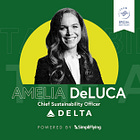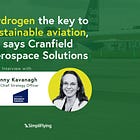#Sustainability20: Airbus Reveals eVTOL Prototype Ahead Of First Flight Test & More
Weekly Roundup - 08/03/24
Each Friday, we publish a round-up of the 20 most important stories on sustainable aviation. You can see previous editions of #Sustainability20 here.
Industry Updates
SWISS partnered with Climeworks, becoming the company's first airline customer, to remove carbon from the atmosphere using direct air capture technology until 2030, reflecting SWISS's ambition to promote critical technologies for net-zero emissions.
Air France-KLM, Delta Air Lines, and Virgin Atlantic launched the Sustainable Airlines Initiative (SAI) with EcoVadis to improve sustainability practices across their value chains through collaboration, transparency, and performance tracking.
The FAA announced final rules requiring aircraft built after 2028 to incorporate fuel-efficient technologies, aiming to reduce greenhouse gas emissions from large aircraft in U.S. airspace as part of the Aviation Climate Action Plan.
Delta aims to reach net-zero emissions by 2050 through fuel reduction, sustainable aviation fuels, and efficient aircraft. In 2023, it saved 21 million gallons of fuel and targets 45 million by 2025.
Denmark will impose a new tax on air passengers starting in 2025 to fund the aviation industry's transition to 100% sustainable fuel for domestic flights, generating around $175 million annually.
Climate watch: Global Warming Is Particularly Bad for Women-Led Families, Study Says - NYT
The UN Food and Agriculture Organization report reveals that extreme heat and flooding disproportionately impact female-headed households in low- and middle-income countries, with these households losing 8% more annual income compared to others. The income disparity widens further, to 34%, when long-term average temperatures rise by 1°C, highlighting the need to address underlying disparities in access to essential services and resources.
Infrastructure and operational efficiencies
Skytanking has deployed the world's first fully electric 40m³ refueling vehicle at Stuttgart Airport, developed by Esterer and Daimler Truck, as part of the airport's 'finalize!' research project.
Air New Zealand, Wellington Airport, Toyota New Zealand, and Hiringa Energy are collaborating to trial using hydrogen to charge electric tugs and service vehicles at Wellington Airport.
Beta Technologies partners with Signature Aviation to install electric aircraft chargers at three East Coast airports, with the first multimodal charger already online at Manchester-Boston Regional Airport in New Hampshire.
Sustainable Aviation Fuel (SAF)
London Gatwick Airport has switched all 300 diesel vehicles to hydrotreated vegetable oil (HVO) fuel, a more sustainable alternative, until they are replaced by electric vehicles as part of its sustainability policy.
FS, a Brazilian ethanol producer, received ISCC certification for SAF feedstock production and the world's first Low LUC Risk certification in collaboration with one of its second-crop corn suppliers, GGF Group.
Aemetis received Authority to Construct (ATC) air permits for its SAF and renewable diesel plant in Riverbank, California. The plant is designed to produce up to 90 million gallons per year, when allocating 50% to SAF and 50% to diesel production, and 78 million gallons per year when allocating 100% production to SAF.
Neste has launched "Neste Impact," a book-and-claim SAF solution for corporations to reduce their air travel and transport carbon footprint, providing third-party verified reports on achieved emissions savings.
New technology: Electric and Hydrogen
Airbus has unveiled the prototype of its new electric vertical takeoff and landing (eVTOL) aircraft, CityAirbus NextGen, with its maiden flight scheduled for later in 2024, aiming to enter the urban air mobility market.
Whisper Aero has proposed a concept for a 100-seat battery-electric regional airliner with electric ducted fans integrated into the wing's leading edge to help aviation achieve net-zero emissions by 2050.
Indonesian company Vela Prima Nusantara is developing the Vela Alpha, a piloted eVTOL aircraft for air taxi, sightseeing, cargo, surveillance, and medevac applications, in partnership with state-owned manufacturer PT Dirgantara Indonesia.
Volocopter gets clearance to start early serial production of VoloCity eVTOL aircraft - FutureFlight
German aviation authority LBA extended Volocopter's production approval, allowing serial manufacturing of its VoloCity eVTOL aircraft, as the company aims for EASA type certification and commercial flights during the 2024 Paris Olympics.
Cranfield Aerospace Solutions has successfully integrated its 240kW hydrogen fuel cell drive train into an aircraft's nacelle, a significant step towards certifying and commercialising its zero-emissions technology for the Britten-Norman Islander by 2026.
Hien Aero Technologies achieved Asia's first levitation test for a large unmanned eVTOL using gas turbine power, and the world's first gas turbine hybrid self-sustaining levitation with its 100 kg "HIEN Dr-One V1" aircraft.
Universal Hydrogen has successfully tested a 1-megawatt fuel cell using liquid hydrogen, the world's largest trial of a liquid hydrogen-powered aircraft powertrain, showing promise for decarbonising regional flights.
Doroni Aerospace has officially revealed its flagship two-seat eVTOL aircraft, the H1-X, during a livestream event, showcasing impressive specifications and being close to market-ready.






